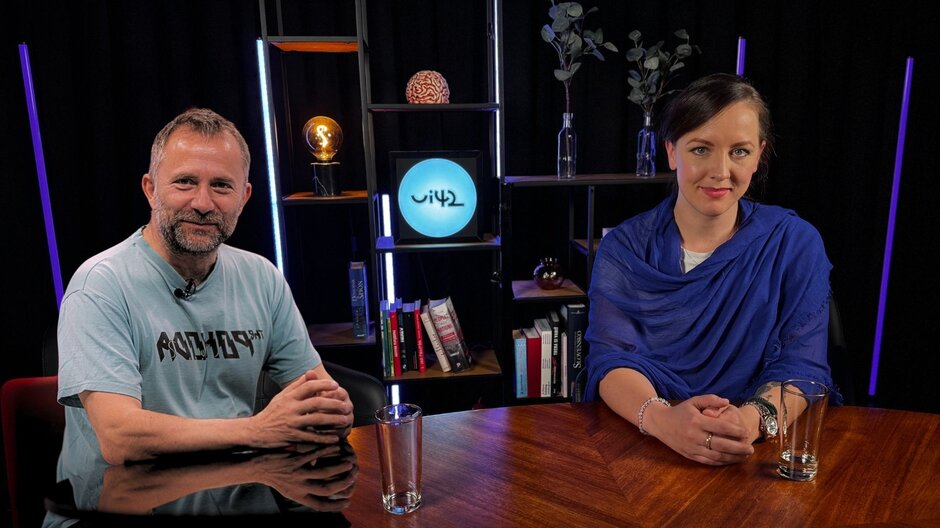Michal Kaščák on finances and the behind-the-scenes of building the Pohoda festival
Founder and organizer Michal Kaščák openly talked about why he decided to build the festival on principles instead of a purely commercial approach in the latest episode of the Biznislab podcast.

Artistic Celebration of Freedom Instead of a Business Model
Festival Pohoda has nearly three decades of history behind it and in 2024, it was awarded the Best Medium-Sized Festival in Europe. Michal Kaščák defines Pohoda as “an artistic celebration of freedom”. The core of the festival is “a meeting of free-spirited people who want to celebrate the diversity of art together, who want to spend time together.” According to him, Pohoda is not just about good bands, but about meeting people who want to live together in a space where they feel safe, free, and fair.
Although he admits that “we often faced the question of whether it is possible to turn the festival into a standard company with positive economic results,” he adds: “we decided long ago that we will not build Pohoda this way.”
On one hand, there are business opportunities: selling hard alcohol, banning own drinks and food, not capping gastronomy prices, which in a standard company would be a clear path to increasing turnover.
Anti-Business Decisions with a Clear Mission
On one hand, there are business opportunities: selling hard alcohol, banning own drinks and food, not capping gastronomy prices, which in a standard company would be a clear path to increasing turnover. On the other hand, there are strong values that prevail in the case of Pohoda, and thanks to them, approximately half of the loyal visitors return to the festival every year.
“Running a festival where you can bring everything except glass and weapons, where you feel safe at night, and where a beer doesn't cost nine euros, that's not a business model. But I have never regretted these decisions,” adds Michal.
Transparency Even in Difficult Times
Pohoda has gone through tough times in recent years. The situation was complicated mainly by the pandemic, when the company with a 12-member year-round team of employees operated as a company without its basic source of income, which is the festival. After a good year in 2022, 2023 saw lower attendance, compounded by the misfortune of having to end the festival early due to a storm.
They managed not only to stabilize the situation but also to significantly improve it in several ways: ticket prices had to be increased, demands on partners increased, and an investor was found in Crowdberry.
Michal Kaščák stands by the fact that open communication is the reason why partners and fans stay with them even in tough times. He says: “It's not an art to run a festival when the weather is nice and everything goes smoothly. The art is to remain fair even when things go wrong.”
Customer Experience as the Basis of Success
Pohoda has become a love brand primarily thanks to the customer experience for visitors. According to Kaščák, “the basis of the festival, in my opinion, is its atmosphere, that is, the visitors.” To create the atmosphere, not only the program is important, but also “services, approach to people, safety, and creating a space where people can feel freer.”
The greatest reward is when people trust the festival so much that they decide to buy tickets even before they know the line-up. This type of trust, according to Kaščák, is “a huge recognition” and at the same time “a huge commitment.”
Multigenerational Festival with a Clear Direction
“Many festivals make the mistake of focusing on the wealthiest part of festival-goers, who are middle-aged people, and young people seem to disappear from them,” adds Michal. Pohoda is a multigenerational festival that grows with its audience. The core consists of young people averaging around 25 years old, but there are also families with small children and older visitors.
Values as a Non-Transferable Identity
In conclusion, Daniela asked: “Have you ever thought about expansion? The brand is strong, you have the know-how, the concept works…”
“No,” Michal answers unequivocally. The festival is closely tied to the place — not only practically but emotionally. “I perceive the airport in Trenčín as the best festival space in the world.” However, he adds that if it were ever necessary to leave, he believes the brand has the strength to succeed elsewhere — without having to sell its soul.
And what inspires the organizer of Pohoda?
Michal Kaščák is most inspired by “meeting people.” He likes to read books and also enjoys “doing nothing” and silence, in which he claims to hear a lot. Recently, he is also inspired by visiting Ukraine, where he sees an absolutely endless source of energy and determination. He sees many inspiring people in Slovakia as well, such as lawyer Roman Kvasnica. Festival Pohoda is “about meeting different worlds,” from artists, through people providing services, to visitors.
Festival Pohoda thus remains an example of how to build a successful project on values and principles without sacrificing authenticity for short-term profit. Kaščák's vision of an “artistic celebration of freedom” proves to be a viable alternative to a purely commercial approach after nearly three decades.

